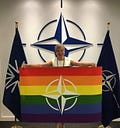This is the final part of my series on Ukraine. It combines background briefings on the diplomatic and military actions leading up to the war with analysis of more recent developments. My aim is to provide a broader informational picture to the reader of current events and their origins from sources in the public domain. Overall, this may help understan…
Keep reading with a 7-day free trial
Subscribe to Frank Wright to keep reading this post and get 7 days of free access to the full post archives.



